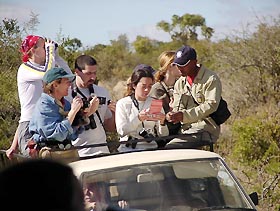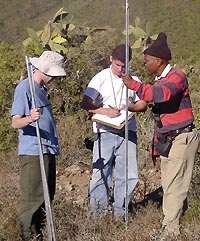|
This is an archived article.
For the latest news, go to the Advance
Homepage
For more archives, go to the Advance Archive/Search Page. |
|||
|
UConn,
Fort Hare Students Learn
From Each Other During Ecology Class By Allison Thompson
"It was intriguing to see so much, yet realize it's a big world and there's so much more to see," he says. "For me, it was a fairly profound experience."
Mosher was one of 16 UConn students enrolled in the three-credit course "Introduction to African Ecology and Renewable Resources Management" who spent three weeks in South Africa's Eastern Cape Province in late May, on a trip led by Professors Morty Ortega and Elizabeth Jockusch. They were joined in South Africa by five students and several faculty from the University of Fort Hare. During their stay, the students lived on the Great Fish River Reserve, a 100,000-acre nature and game reserve complex surrounded by commercial farms and poor rural communities. Through lectures, field trips, and time spent conducting research on the reserve, the students learned about ecological systems in southern Africa and about their management. "The idea of the class was to teach them about African ecology," says Ortega, an assistant professor of natural resources management & engineering. "To do that, they needed to go out and see things." An equally important aspect of the trip was to teach the students about the world. "The purpose was to expose students to South Africa," he says. "By talking to Fort Hare students both in the field and on campus, and by visiting a rural community, where they learned how South Africans manage their land and live in such an arid environment, UConn students learned a great deal about the culture of South Africa." According to Peter Lent, an associate professor of animal science at Fort Hare and one of the organizers of the course, the UConn students in turn helped open the eyes of the students and professors they encountered. "I think the Fort Hare students certainly appreciated the enthusiasm of the American students, as well as the intense interest and intellectual curiosity the students and professors displayed," says Lent. "Education in South Africa tends to be more formal, so the Fort Hare instructors liked seeing the projects the students presented." Before they could begin exploring South Africa or even get into the class, the UConn students had to fill out an application explaining why they wanted to go to Africa. Ortega and Jockusch, an assistant professor of ecology and evolutionary biology, received more than 30 applications. They ultimately selected 13 undergraduate and three graduate students to participate in the class. During the spring semester, the chosen students, all of whom had taken ecology and wildlife management classes previously, met several times to hear guest lectures and prepare for the trip. Once they arrived in South Africa, each student had to do an original research project, either alone or as part of a group, says Ortega. Topics ranged from examining vegetation on the reserve to studying insects and animals. Erik Reyer, who will be a senior at UConn in the fall, conducted a research project with Fort Hare students. During their long hours together, Reyer says the group had lengthy talks about their lives, exploring the similarities and differences. He hopes to return to South Africa one day and encourages others to travel to the country themselves to see what it's like. "Americans don't understand Africa in general, and they definitely don't understand South Africa," Reyer says. While many Americans think of Africa as a vast expanse of jungle, Reyer points out that South Africa has varied climates and numerous cities. The group spent one day in Cape Town, which Reyer says is similar to a large North American city. "A lot of people think of Africa as a lot of nothing," Reyer says. "Cape Town is the same as here, but signs are in many different languages." Like Reyer, Mosher welcomed the opportunity to work with Fort Hare students. "Working and living with South Africans was amazing," Mosher says. "The overall experience was so much more than learning about plants and animals. It was also about getting exposure to another culture." Lent views the interaction between the UConn students and the South African students as an integral part of the trip. "It would be crazy to just bring American students to South Africa and not have them interact with South African students," he says. The course will be taught again next spring and then every other year, Ortega says. The class is the first collaborative one under the UConn-University of Fort Hare Linkage, which is supported by the United Negro College Fund. The class, jointly organized by Fort Hare and UConn's departments of natural resources management & engineering and ecology & evolutionary biology, received additional funding from private sources and the Chancellor's Office. |
 fter spending three weeks living and doing research on
a South African game reserve, graduate student Eric Mosher feels he
knows a lot about the country's ecology. But what's more
important, he says, is what he learned about himself.
fter spending three weeks living and doing research on
a South African game reserve, graduate student Eric Mosher feels he
knows a lot about the country's ecology. But what's more
important, he says, is what he learned about himself.

